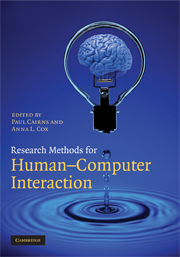Book contents
- Frontmatter
- Contents
- List of figures
- List of tables
- List of contributors
- Preface
- 1 Controlled experiments
- 2 Questionnaires, in-depth interviews and focus groups
- 3 Eyetracking in HCI
- 4 Cognitive modelling in HCI research
- 5 Formal analysis of interactive systems: opportunities and weaknesses
- 6 Using statistics in usability research
- 7 A qualitative approach to HCI research
- 8 Methodological development
- 9 Theoretical analysis and theory creation
- 10 Write now!
- 11 Applying old research methods to new problems
- References
- Index
11 - Applying old research methods to new problems
Published online by Cambridge University Press: 05 April 2016
- Frontmatter
- Contents
- List of figures
- List of tables
- List of contributors
- Preface
- 1 Controlled experiments
- 2 Questionnaires, in-depth interviews and focus groups
- 3 Eyetracking in HCI
- 4 Cognitive modelling in HCI research
- 5 Formal analysis of interactive systems: opportunities and weaknesses
- 6 Using statistics in usability research
- 7 A qualitative approach to HCI research
- 8 Methodological development
- 9 Theoretical analysis and theory creation
- 10 Write now!
- 11 Applying old research methods to new problems
- References
- Index
Summary
The History of every major Galactic Civilization tends to pass through three distinct and recognizable phases, those of Survival, Inquiry and Sophistication, otherwise known as the How, Why and Where phases. For instance, the first phase is characterized by the question ‘How can we eat?’ the second by the question ‘Why do we eat?’ and the third by the question ‘Where shall we have lunch?’
Douglas AdamsOverview
Given the complex and dynamic nature of HCI, it could be argued that the methods described here, whilst successful so far, may not be sufficient to address the challenges of HCI research in future. The purpose of this chapter is to show that even in the new area of user experience, these methods are still able to structure investigations and so provide insights and knowledge that we hope will be valuable to other researchers. Of course, this new area also shows up some of the limitations of the existing methods and this leads us to discuss the relationship between HCI as it might be in future and the research methods it has and may come to need.
Before describing our research into user experience, it is worth discussing the move in HCI towards user experience and why it seems a natural trajectory for HCI to take.
From usability to user experience
Traditional usability, as embodied in standards such as ISO 9241, have focused on users being able to interact with a system in a given context in a way which is effective, efficient and satisfying.
- Type
- Chapter
- Information
- Research Methods for Human-Computer Interaction , pp. 212 - 220Publisher: Cambridge University PressPrint publication year: 2008
- 1
- Cited by



